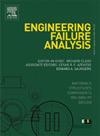Research on TBM parameter optimization based on failure probability
IF 4.4
2区 工程技术
Q1 ENGINEERING, MECHANICAL
引用次数: 0
Abstract
This study addresses the over-reliance on operator experience in Tunnel Boring Machine (TBM) operations by proposing a failure probability-based decision-making method to enhance the scientific accuracy and reliability of construction decisions. In large deformation soft rock zones, TBMs are significantly affected by surrounding rock stress and deformation, which can lead to reduced tunneling speed or even shield jamming, severely impacting construction progress and safety. To reduce subjective biases in operator decision-making, this study combines the stress release coefficient with a failure probability model to establish a limit equilibrium equation. Using Monte Carlo simulations, failure probabilities under varying geological conditions are evaluated, and the optimal tunneling parameters are selected by analyzing the cumulative effect over time. Additionally, the study incorporates a Bayesian updating method, dynamically adjusting model parameters based on periodic monitoring data, further reducing uncertainty and improving the accuracy of the decision support system. The results show that while higher tunneling speeds increase the instantaneous failure probability, considering the cumulative effect over time, the overall failure index decreases with increased speed. Conversely, lower speeds result in a lower instantaneous failure probability but prolonged exposure to high-risk conditions increases the overall failure index. With this decision-making method, operators can quantitatively and in real-time adjust tunneling parameters under complex geological conditions, minimizing failure risks and improving construction efficiency.
基于失效概率的 TBM 参数优化研究
本研究针对隧道掘进机(TBM)作业中过度依赖操作人员经验的问题,提出了一种基于失效概率的决策方法,以提高施工决策的科学性和可靠性。在大变形软岩区域,隧道掘进机受围岩应力和变形影响较大,可能导致掘进速度降低甚至盾构堵塞,严重影响施工进度和安全。为减少操作员决策中的主观偏差,本研究将应力释放系数与失效概率模型相结合,建立了极限平衡方程。通过蒙特卡罗模拟,对不同地质条件下的失效概率进行评估,并通过分析随时间变化的累积效应来选择最佳隧道参数。此外,该研究还采用了贝叶斯更新方法,根据定期监测数据动态调整模型参数,进一步降低了不确定性,提高了决策支持系统的准确性。结果表明,虽然较高的隧道掘进速度会增加瞬时故障概率,但考虑到随着时间推移的累积效应,整体故障指数会随着速度的增加而降低。相反,较低的速度会导致较低的瞬时故障概率,但长期暴露在高风险条件下会增加总体故障指数。有了这种决策方法,运营商就可以在复杂的地质条件下定量、实时地调整隧道参数,最大限度地降低故障风险,提高施工效率。
本文章由计算机程序翻译,如有差异,请以英文原文为准。
求助全文
约1分钟内获得全文
求助全文
来源期刊

Engineering Failure Analysis
工程技术-材料科学:表征与测试
CiteScore
7.70
自引率
20.00%
发文量
956
审稿时长
47 days
期刊介绍:
Engineering Failure Analysis publishes research papers describing the analysis of engineering failures and related studies.
Papers relating to the structure, properties and behaviour of engineering materials are encouraged, particularly those which also involve the detailed application of materials parameters to problems in engineering structures, components and design. In addition to the area of materials engineering, the interacting fields of mechanical, manufacturing, aeronautical, civil, chemical, corrosion and design engineering are considered relevant. Activity should be directed at analysing engineering failures and carrying out research to help reduce the incidences of failures and to extend the operating horizons of engineering materials.
Emphasis is placed on the mechanical properties of materials and their behaviour when influenced by structure, process and environment. Metallic, polymeric, ceramic and natural materials are all included and the application of these materials to real engineering situations should be emphasised. The use of a case-study based approach is also encouraged.
Engineering Failure Analysis provides essential reference material and critical feedback into the design process thereby contributing to the prevention of engineering failures in the future. All submissions will be subject to peer review from leading experts in the field.
 求助内容:
求助内容: 应助结果提醒方式:
应助结果提醒方式:


